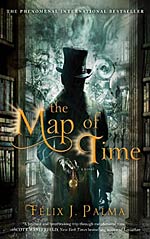
![]() gallyangel
gallyangel
4/7/2017
![]()
The Map of Time
This was not the novel I thought it was, and yet it was in fact the novel I thought it was.
I thought I was going to get some time travel adventure that mixed historical and fictitious late victorian figures. But in the first two sections of the novel, the time travel was fictitious hoaxes. The third section did have time travel, which all but eliminated itself due to the differing choices made by the time traveler - creating a whole new time line where the time travelers didn't exist.
Did I enjoy this novel? About the half way point I decided that I'd really had enough of the author's style. That he pads and pads to the point where one can just scream get on with it. There was one point midway in the second section where once I understand where the plot lines were going, I literately covered a 100 pages in about half an hour, reading snip-its of paragraphs, a sentence here and there. It was more than enough to confirm that the author ended up exactly, with the same outcomes, where I thought he would. No surprises. That seems to me a major failing.
But then the third section opened up with actual time travel. But with the rehash of the basics of time travel complexity, a plot that was transparent, and the usual wordiness, that section didn't do much for me either. Even the big idea of a library of book manuscripts, stolen from name authors so no one in the general public knows anything about them, wasn't original. I'd heard it before. (And there are even more interesting ideas further along that line of thought which the author didn't get into.) And then, as a cap to the whole thing, once the whole of the time travel timeline had collapsed, the author dragged us into a brief discussion of the reciprocal relationship between author and character, as if this was a crowning intellectual achievement. Sorry. No. He was rehashing the old Heinlein theorem concerning parallel worlds and the author's relationship to them and a manuscript. Nothing new there, either.
So, would I read this again?
No.
Would I read it's sequels?
Highly doubtful.
Would I recommend it?
It's to slow for steampunk. You'd have to like a wordy and a slowly unwinding plot to enjoy this. If you like Wells, Wells as a character is sort of interesting but reading Wells himself is far better than this. If you care for the late Victorian setting, then you might like it, since I will say the background details of mixing historic and fictitious characters was well done. Just as placing them in something resembling the image we have of late Victorian England was well done as well. But that's background and it doesn't make or break a novel. That happens else where.
I guess my assessment is one big sigh. It's over with. Time, undoubtedly, to simply move on.